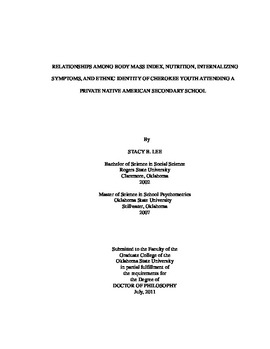| dc.contributor.advisor | Yetter, Georgette | |
| dc.contributor.author | Lee, Stacy B. | |
| dc.date.accessioned | 2013-11-26T08:34:39Z | |
| dc.date.available | 2013-11-26T08:34:39Z | |
| dc.date.issued | 2011-07 | |
| dc.identifier.uri | https://hdl.handle.net/11244/7477 | |
| dc.description.abstract | Scope and Method of Study: The present study provided a window into the relationships among overweight, internalizing symptoms, ethnic identity and healthy eating practices for one sample of American Indian youth living in a American Indian community. | |
| dc.description.abstract | Findings and Conclusions: In this study, ethnic identity, internalizing symptoms, and nutrition together did not predict a significant amount of variance in BMI. Youth who felt curious about their traditional culture and wished to investigate it further (high in ethnic identity Exploration) were more likely to eat nutritious foods. Likewise, youth who felt comfortable with being American Indian and who had integrated American Indian cultural beliefs, practices, and understandings into their identity (high in ethnic identity Resolution) also ate nutritious foods more frequently than their lower-resolved peers. Ethnic identity Affirmation, the degree to which individuals felt positively about their ethnicity, was not related to nutritional practices. The majority of participants in this study reported average levels of anxiety and depression symptoms. Our data did not indicate a higher occurrence of anxiety or depression in high-BMI adolescents. Lastly, the weight distribution of this sample was similar to estimates found in national samples. | |
| dc.format | application/pdf | |
| dc.language | en_US | |
| dc.rights | Copyright is held by the author who has granted the Oklahoma State University Library the non-exclusive right to share this material in its institutional repository. Contact Digital Library Services at lib-dls@okstate.edu or 405-744-9161 for the permission policy on the use, reproduction or distribution of this material. | |
| dc.title | Relationships among body mass index, nutrition, internalizing symptoms, and ethnic identity of Cherokee youth attending a private Native American secondary school | |
| dc.contributor.committeeMember | Stinnett, Terry | |
| dc.contributor.committeeMember | Fuqua, Dale | |
| dc.contributor.committeeMember | Chaney, John | |
| osu.filename | Lee_okstate_0664D_11483.pdf | |
| osu.accesstype | Open Access | |
| dc.type.genre | Dissertation | |
| dc.type.material | Text | |
| dc.subject.keywords | educational psychology | |
| thesis.degree.discipline | Educational Psychology | |
| thesis.degree.grantor | Oklahoma State University | |
